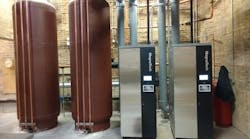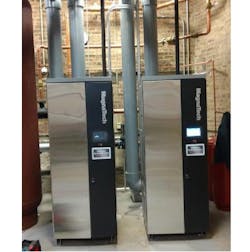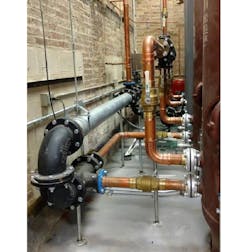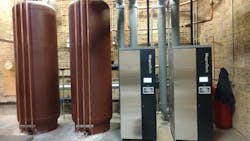Latest from Hydronics Systems
Sponsored
Gold Standard Baking swaps-out old steam system
If you’ve ever eaten in a restaurant in the Chicago area, chances are you’ve sampled the taste of goods baked by Gold Standard Baking, a wholesale baked goods supplier to many restaurants, food service businesses and convenience stores in the metro area.
Becoming the go-to bakery for so many isn’t easy to achieve. Gold Standard’s extensive reach is based on quality, and their reach is expanding.
Getting the process right is the foundation for Gold Standard’s success. The perfect ingredients won’t matter if the process isn’t just right.
A key facet of that recipe is the need to keep everything clean — Gold Standard clean. This is where Paul Harvey would interrupt to say: And soon you’ll know the rest of the story.
Gold Standard’s standard is what sets them apart. From melt-in-your-mouth croissants and butterflake rolls to signature breads and English muffins, every Gold Standard Baking product is baked with special care for “taste the others can’t touch.”
Founded in 1987, it’s grown from a neighborhood bakery to a world-class baked goods supplier. And now, with expanded capabilities, new technologies and new culinary expertise, it’s quickly become one of the leading go-to baked goods source for commercial food suppliers.
Managers made it a corporate policy to invest in the very latest, state-of-the-art technologies.
Case in point — Gold Standard recently installed a fully automated laminated dough processing line, increasing its production capacity tenfold. Another key investment was finally casting off an old, domestic and process water heating system that not only required routine maintenance, but wasted fuel.
Out with the old
Of course, the balance between quality and cost savings is key for any business to thrive. Gold Standard Baking achieved this with its recent upgrade of domestic hot water systems that, previously, sourced heat from a clunky steam boiler paired with large shell-and-tube heat exchangers.
Jeremy Angarola is project manager for Montgomery, Ill.-based MVP Plumbing, the firm chosen to complete comprehensive plumbing at Gold Standard’s old/retrofitted facility, with new additions.
“We installed the new hot water system to provide ample domestic and process hot water as part of an entire, facility-wide plumbing retrofit,” Angarola says.
The system incorporates state-of-the-art Bradford White condensing volume water heaters, complete with two, super-insulated, vertical 720-gal. Niles Steel Tanks storage containers.
Billy Ford, a manufacturers rep from Friedman and Dorrans Sales, described the system retrofit. “The bakery was fully dependent on an old steam boiler from when they had moved into the building six or seven years ago,” he says. “Bakery managers were making a transition from the old, inefficient steam boiler and while they were expanding to put more lines in the plant, decided to change the hot water system at that point — making the switch from steam to hot water.”
With the old system, steam produced from the original boiler passed through heat exchangers to heat the water for the plant. By eliminating the heat exchangers and having the domestic water heated directly, Gold Standard Baking increased the system efficiency overall, reducing costly fuel consumption.
The science behind it is simple: Heat exchangers have an effectiveness rating which means that not all the heat is transferred to the cooler fluid — domestic and process water in this case.
This is an inherent source of inefficiency in a system that relies on them in addition to any losses in the boiler heating process. Coupling a steam boiler (noncondensing, of course) with heat exchangers both decreases system efficiency and makes the supply temperature difficult to control.
A key feature of the new mechanical recipe they chose: two 2-million Btu Bradford White MagnaTech volume water heaters.
According to Ford, bakery managers were pleased with his recommendation of the mod-con hot water systems because of “the efficiencies, the ability to modulate, the ability to cascade and the design of their heat exchanger — all capabilities that I explained to them in detail.”
Bradford White’s heat exchanger design consists of multiple micro-finned heating tubes that maximize contact area for optimal heat transfer, increasing efficiency and providing a much-needed operating cost reduction.
Ford further explains, “The way that the volume water heaters are piped at the bakery, we’re actually putting the coldest water possible into them to be able to get them to condense to keep them in that 90 percent to 93 percent [operational] efficiency range.”
Ultimately, keeping the system running at optimal efficiency also requires modulation. That’s something the MagnaTech water heaters have going for them with a 5-to-1 modulating gas valve in each boiler. And, by design, the boilers are able to cascade, giving a combined 10:1 modulation for the two boilers installed.
Ford says this allows for “maximum savings to the building, fuel-wise, by only providing the water that’s necessary.”
And for a process as precise as baking, this modulation is vital, particularly since the same system provides hot water for other services like wash-down and domestic hot water to washrooms and sinks.
“For a facility of this size, and with substantial need for process and domestic hot water, this system is the ultimate, no-compromise approach,” Angarola adds.
So what does Gold Standard Baking think of its new system?
The company is preparing to build a new plant, which will also require process and domestic hot water. Ford learned that Gold Standard managers are so pleased with the result of this project that they plan to replicate the mechanical system recipe for the new facility.





